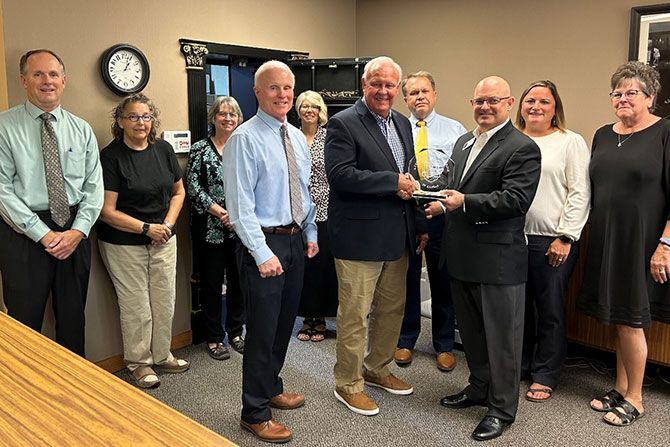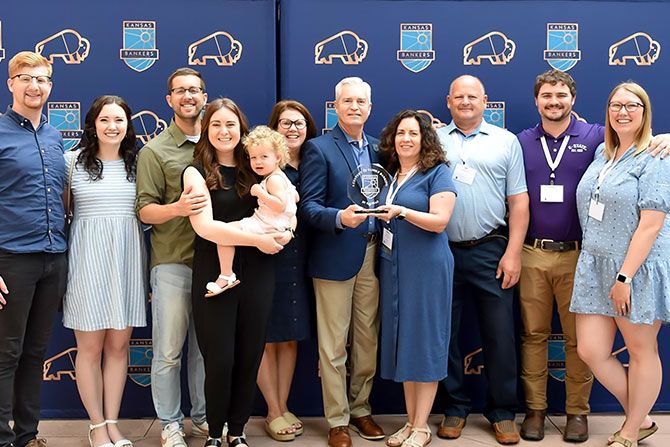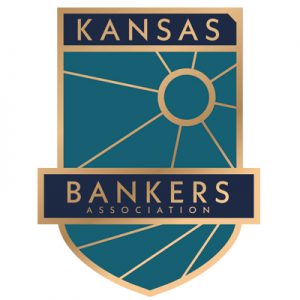Riordan Family, Solomon State Bank

Timothy T. (T.T.) Riordan began the family’s banking tradition in approximately 1910 when he began working at the Solomon National Bank, being previously employed at The Niles State Bank, located approximately seven miles northwest of Solomon. Over the years, T.T. Riordan held the title of either President or Chairman until his passing in 1963. T.T. Riordan was very instrumental in bringing the D.S. & 0. Rural Electric Cooperative to Solomon in the 1930s through a contact he had made while working at the Niles State Bank.
T.T.’s son, Richard D. Riordan, served from 1951 to 1978 as President. Richard’s wife, Julie Riordan, served from 1978-2005 as President and then Director. David R. Riordan, Richard and Julie’s son, served from 1973 to 2017 as President and is currently Director. Dennis J. Riordan, Richard and Julie’s other son, has served since 1978, currently as Vice President and CEO.
Solomon State Bank is one of the oldest financial institutions in Central Kansas. It was chartered and opened for business at 126 W. Main in Solomon, Kansas on June 22, 1905, by a group of Salina businessmen, with Frank Hageman serving as the first president of the bank. On June 28, 1910, the Solomon State Bank converted to the Solomon National Bank. On Sept. 3, 1927, The Solomon National Bank acquired The Citizens State Bank located at 139 W. Main, Solomon, Kansas. On April 15, 1970, The Solomon National Bank converted back to a State Bank and has remained so since that time. A branch bank was opened in Abilene in January of 1990, and a branch opened in Salina in September of 1996.
When asked about the bank’s success through the years, the Riordans’ collective response was, “It can be attributed to good customers and loyal employees.”
Congratulations to the Riordan family for receiving the Century of Family Banking Award and for their 100 years of service to the banking industry.
Schifferdecker Family, GNBank N.A.

The Farmers and Miners State Bank was started in 1918. In 1923, Earl Schifferdecker began working there as a bookkeeper at a monthly salary of $75. Earl then joined the board in 1925. In 1929, the bank became a national bank, and the name changed to The Girard National Bank. Times were hard and profit was minimal. The bank’s profit in 1936 was only $600.
Earl became the bank’s President in the late 1930s while the country was in the midst of World War II. There were many farm sales in those days, and Earl was busy nearly every weekend clerking sales. Earl had quite the reputation for being able to keep up as both clerk and cashier, approving many loans at the same time.
In 1956, Earl’s son, Martin, started at the bank. Martin loved technology. It took some convincing, but Martin talked his father into investing in a proof machine. This was the first time in history that a bank actually balanced. Martin continued to be a champion of technology throughout his career.
In 1960, Earl began the community’s best-known tradition — the annual bank Christmas Eve dinner. At first, Earl’s gathering was limited to a few friends, a game of “pitch,” ham sandwiches and a jug of wine in the basement of the bank. Martin later expanded the menu to a full dinner. The tradition has continued for over 60 years, with the bank feeding around 2,000 people.
Earl did not act and dress like most bankers … he would frequently come into the bank in a soiled work shirt with cow manure on his boots after checking his cattle herd. Many older customers have recalled that when no other banker would help them, Earl gave them a start. In 1974, at the age of 70, Earl passed away, but his genuine concern for the working man won him a special place in the hearts of everyone who knew him.
In 1974, Martin became the president of the bank. Martin’s style was different from his father’s, but he was also a very genuine and generous leader. Martin led the bank with utmost integrity and was a godly example to all those who worked for him. In 2015, at the age of 80, Martin passed away, coming to the bank that very day.
In the mid-1980s, the Schifferdecker family began to expand the bank’s footprint. The bank currently serves 12 communities in Kansas and two in Colorado. Martin’s brother John joined the bank in 1990. John retired in 2001 but still serves on the bank’s board.
Martin’s son Mark joined the bank in 1995. Mark became President & CEO in 2003. Besides serving on the KBA board, Mark has served on the boards of Banker’s Bank of Kansas, Federal Reserve Bank of Kansas City and FHLBank Topeka. John’s daughter, Nancy George, began working at the bank in 1999 and serves as the bank’s Chief Risk Officer and on the board. Both Mark and Nancy strive to lead the community bank with integrity and diligence.
Other family serving/served on the board include Florene, Sandra, and Nancy Schifferdecker. In 2018, the bank’s name changed to GNBank, N.A.







